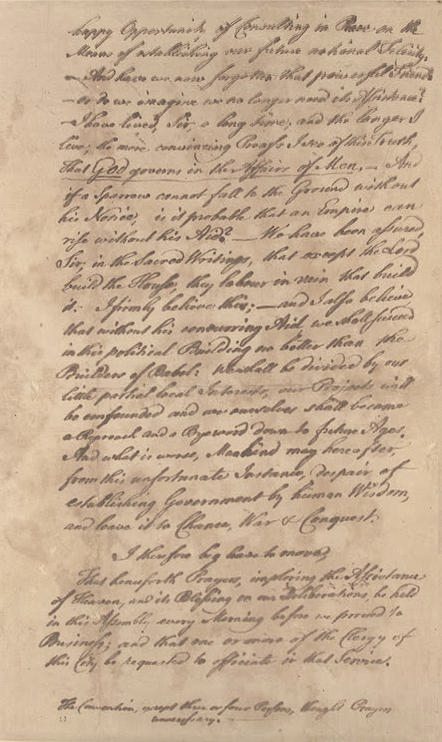Benjamin
Franklin's Motion for Prayer
|

| The constitutional convention called
to Philadephia in May of 1787 to revise the unworkable Articles of Confederation
was coming apart in disagreement over the powers the States were willing
to relinquish to a federal authority. In particular, small states
and large states were in total disagreement over the matter of representation
of the States in the new Congress. The dispute was so deep that it
looked as if the Convention was destined to failure. The New York
delegates had already left in disgust. It was then that the 81-year-old
Benjamin Franklin took the floor to offer a motion that left the delegation
speechless -- and ready to search for a breakthrough solution.
There are several accounts of this event, differing only slightly in some details. The earliest version appeared in a national journal as related by William Steele in a 1925 letter to his son, Jonathan ... which in turn the senior Steele picked up a conversation with General Jonathan Dayton, present at Franklin's speech as a member of the Constitutional Convention. James Madison (who actually kept notes at the Convention) in a couple of letters subsequent to this publication, indicated that he differed with the Dayton account ... not so much in terms of the speech itself but in the matter of the follow-up action (or inaction) of the Convention in response to Franklin's speech. Finally in a later account of the event in Madison's journal, he included a copy of Franklin's speech in Franklin's own handwriting (photocopied below). That version is as follows: |

| Mr. President
The small progress we have made after 4 or five weeks close attendance & continual reasonings with each other,”our different sentiments on almost every question, several of the last producing as many noes and ays, is methinks a melancholy proof of the imperfection of the Human Understanding. We indeed seem to feel our own want of political wisdom, some we have been running about in search of it. We have gone back to ancient history for models of Government, and examined the different forms of those Republics which having been formed with the seeds of their own dissolution now no longer exist. And we have viewed Modern States all round Europe, but find none of their Constitutions suitable to our circumstances. In this situation of this Assembly, groping as it were in the dark to find political truth, and scarce able to distinguish it when presented to us, how has it happened, Sir, that we have not hitherto once thought of humbly applying to the Father of lights to illuminate our understandings? In the beginning of the Contest with G. Britain, when we were sensible of danger we had daily prayer in this room for the divine protection. ”Our prayers, Sir, were heard, and they were graciously answered. All of us who were engaged in the struggle must have observed frequent instances of a Superintending providence in our favor. To that kind providence we owe this happy opportunity of consulting in peace on the means of establishing our future national felicity. And have we now forgotten that powerful friend? I have lived, Sir, a long time, and the longer I live, the more convincing proofs I see of this truth- that God governs in the affairs of men. And if a sparrow cannot fall to the ground without his notice, is it probable that an empire can rise without his aid? We have been assured, Sir, in the sacred writings, that "except the Lord build the House they labour in vain that build it." I firmly believe this; and I also believe that without his concurring aid we shall succeed in this political building no better than the Builders of Babel: We shall be divided by our little partial local interests; our projects will be confounded, and we ourselves shall become a reproach and bye word down to future ages. And what is worse, mankind may hereafter from this unfortunate instance, despair of establishing Governments be Human Wisdom and leave it to chance, war and conquest. I therefore beg leave to move, that henceforth prayers imploring the assistance of Heaven, and its blessings on our deliberations, be held in this Assembly every morning before we proceed to business, and that one or more of the Clergy of the City be requested to officiate in that service. |
